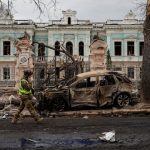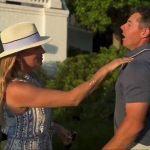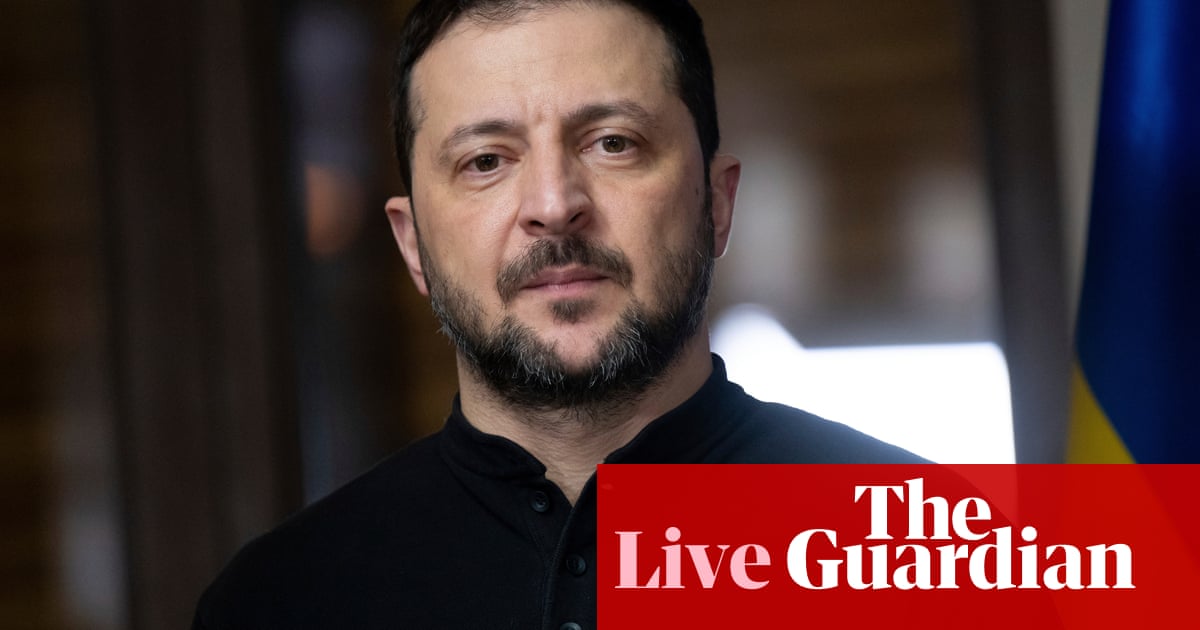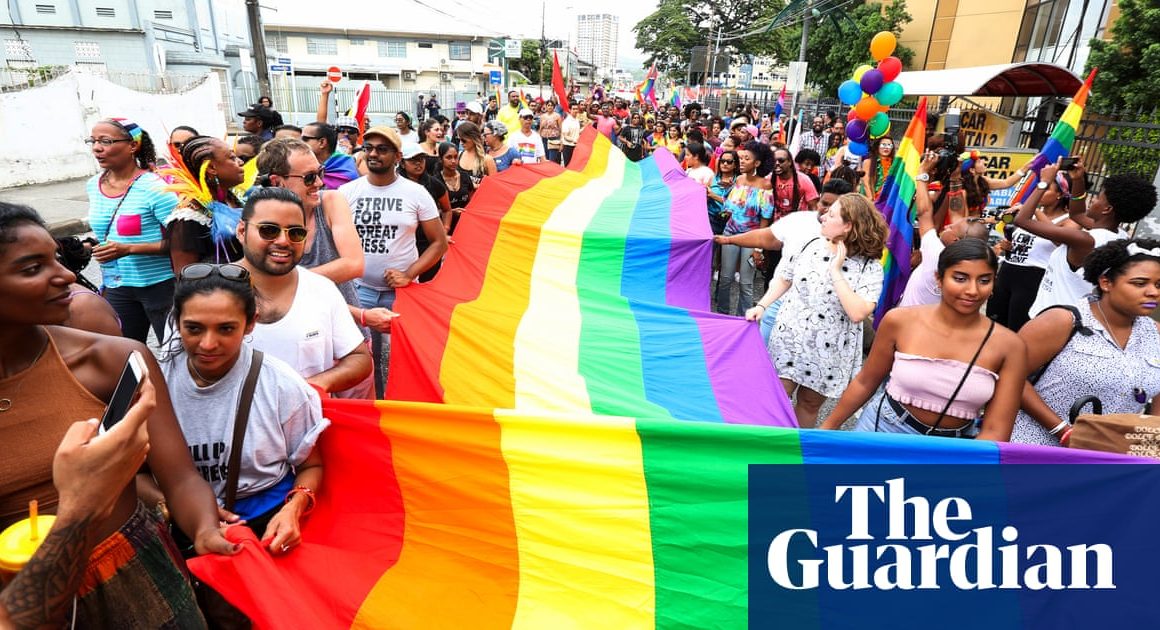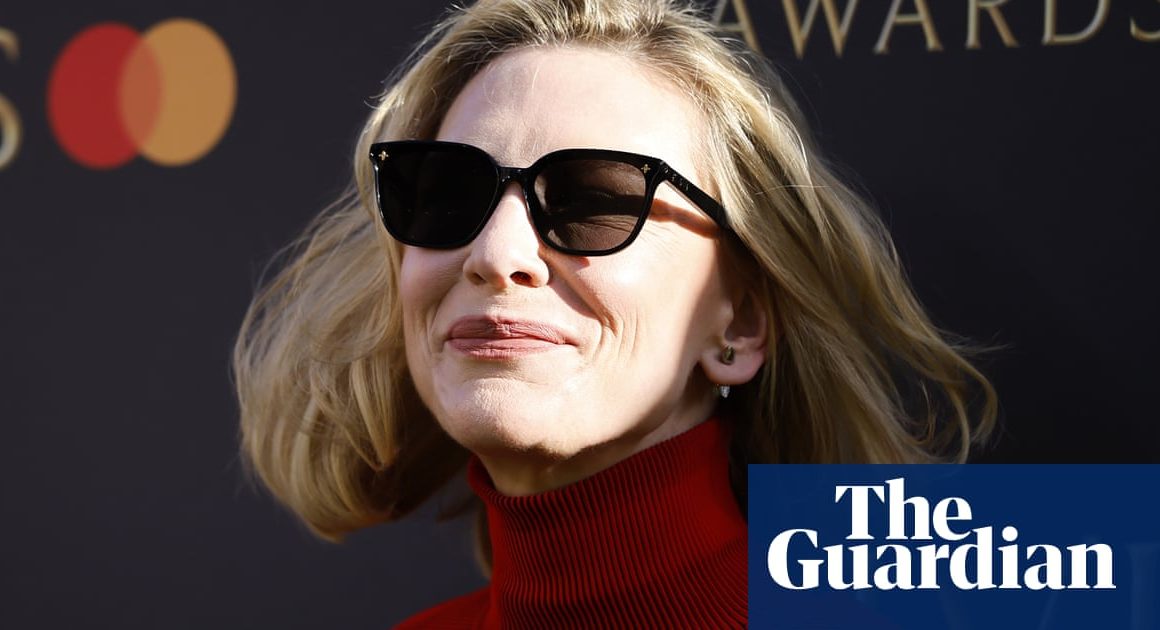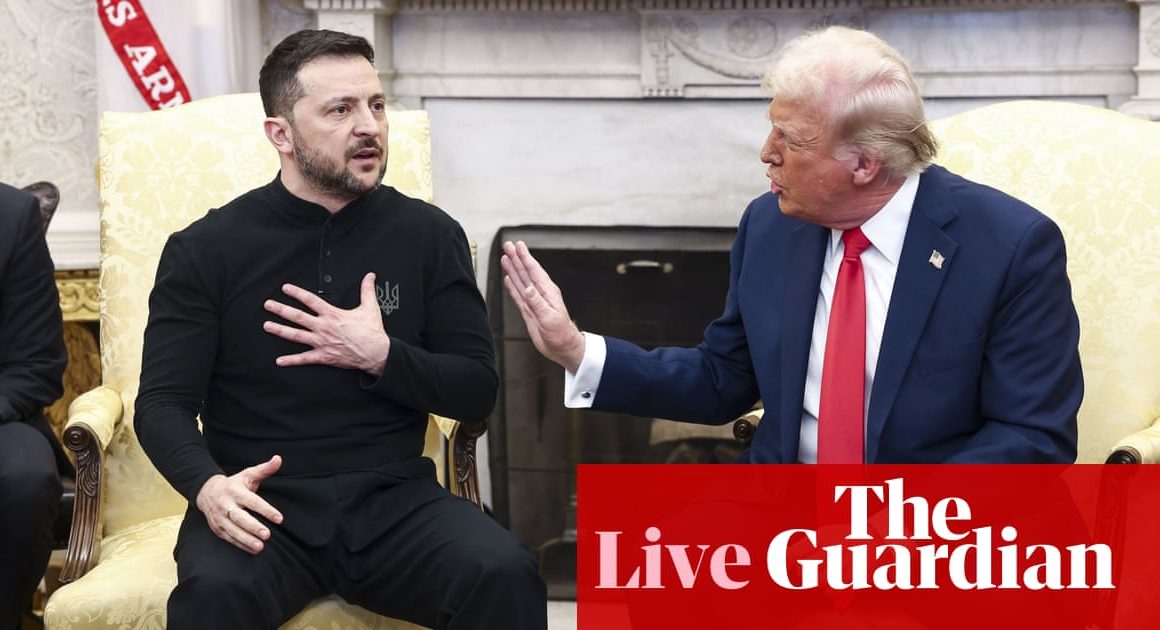Ukraine will not accept US-Russia talks outcome if not involved, Zelenskyy says
We’re also now hearing directly from Ukrainian president Volodymyr Zelenskyy, commenting on the US-Russia talks in Saudi Arabia.
In comments reported by the Associated Press and Reuters, he said Ukraine won’t take part in US-Russia talks this week on ending the war and won’t accept the outcome of the talks if Ukraine doesn’t take part.
Speaking to journalists on a conference call from the United Arab Emirates, Zelenskyy said his government had not been invited to Tuesday’s planned talks in Saudi Arabia.
He said they would “yield no results,” given the absence of any Ukrainian officials.
“Ukraine regards any negotiations on Ukraine without Ukraine as ones that have no result, and we cannot recognise … any agreements about us without us,” he said.
The Ukrainian president also said that “for the first time” he noted some interest from China over any settlement of Russian invasion of Ukraine.
Zelenskyy also pushed back on the floated idea of a minerals agreement with the US, saying that Ukraine cannot be just seen as a “simple supplier of raw materials,” and that any deal would need to include “at least somehow” additional security guarantees.
He said that he expected to get more clarity on any future meeting with Trump only after US envoy Keith Kellogg visited Ukraine.
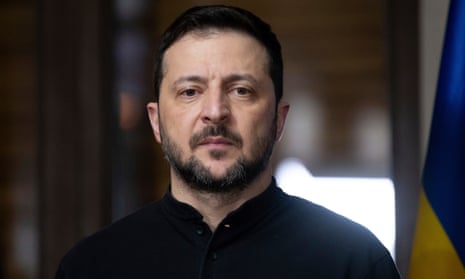
Key events
-
If we fail to spend now, we will spend 10 times more during war, Poland’s Tusk warns
-
Pope Francis faces ‘complex’ clinical picture as hospitalisation continues
-
Europe needs to ‘step up’ its defence capability, UK Starmer says ahead of Paris talks, as he confirms plans to visit Trump
-
View from the Élysée ahead of Paris talks
-
Ukraine will not accept US-Russia talks outcome if not involved, Zelenskyy says
-
Poland will not send troops to Ukraine, prime minister Tusk says
-
Russian view on negotiations with US
-
Pro-Russian hackers hit Italian transport system, banks after threats of ‘consequences’ over president’s criticism of Russia
-
Ukrainian president Zelenskyy to visit Saudi Arabia on Wednesday
-
Confirmation of US-Russia talks on Tuesday
-
Poland’s Sikorski floats idea of Nobel peace prize for Trump for fair peace deal in Ukraine
-
Europe needs to show unity, come up with plans on security guarantees, Spanish foreign minister says
-
Sweden could be part of peacekeeping forces in Ukraine, prime minister says
-
Norway, UK with ‘clear expectation’ Ukraine and Europe must be involved in peace talks with Russia
-
Italian singer claims he was asked to perform in Russia to mark end of Ukraine war
-
Hungary welcomes US-Russia talks, criticised ‘pro-war’ European leaders
-
US Rubio arrives in Riyadh for talks with Russia
-
US Ukraine envoy Kellogg to visit Warsaw on Tuesday
-
Sweden does not rule out sending troops to Ukraine
-
UK prepared to send troops to Ukraine, Starmer says
-
Morning opening: Make Europe Relevant Again
-
Paris talks on Ukraine, European security – context
If we fail to spend now, we will spend 10 times more during war, Poland’s Tusk warns
After his press conference earlier (13:01), Polish prime minister Donald Tusk has now made further comments – unusually, this time in English – on social media, warning that Europe should not shy of making necessary defence commitments now as it would have to “spend 10 times more if we don’t prevent a wider war.”
He once again points to Poland’s track record in this matter, as the country spends 4.7% of its GDP on defence, way above the Nato target of 2%.
Here is what he said:
If we, Europeans, fail to spend big on defence now, we will be forced to spend 10 times more if we don’t prevent a wider war.
As the Polish PM I’m entitled to say it loud and clear, since Poland already spends almost 5% of its GDP on defence. And we will continue to do so.
Pope Francis faces ‘complex’ clinical picture as hospitalisation continues
Pope Francis has a “complex clinical picture” with a “polymicrobial infection of the respiratory tract,” which will require further hospitalisation, his spokesperson confirmed.
There was no timeframe given for his hospitalisation, but spokesperson said the complexity of his symptoms “will require an appropriate hospital stay.”
Europe needs to ‘step up’ its defence capability, UK Starmer says ahead of Paris talks, as he confirms plans to visit Trump
British prime minister Keir Starmer has said that Europe needs to “step up in terms of our collective response in Europe” as he travels to join European leaders in Paris for emergency talks on Ukraine.
“By that, I mean playing our full part when it comes to the defence of the sovereignty of Ukraine if there’s a peace agreement,” he said, quoted on our UK liveblog and the BBC.
Last night, Starmer said the UK would be ready to deploy troops to Ukraine as part of a peacekeeping force (9:32).
The British PM also said that any Ukraine deal would need to be “just and enduring.”
“The last thing I want to see is a pause in the fighting that simply gives Putin the chance to come again,” he said in comments reported by the AFP.
Separately, his office also has confirmed in the last few minutes that Starmer will travel to Washington DC next week to meet US president Donald Trump, the first European leader since Trump’s inauguration last month.
You can read more details lined from Starmer and our coverage of UK politics on our UK live blog here:
View from the Élysée ahead of Paris talks

Jon Henley
in Paris
Élysée officials have said the key objective of today’s mini-summit is to seek agreement on what concrete actions European governments should and can take, including making progress on the fraught question of how to fund a major increase in defence spending.
“We consider that, in view of the acceleration of the Ukraine situation and in view, also, of what US leaders have said, there is a necessity for the Europeans to do more, better, and in a coherent manner, for our collective security,” an adviser said.
The meeting also aims to reassure Kyiv that as the US and Russia begin peace talks this week that could result in a settlement Ukraine could not sign up to, Europeans – including the UK – would stand by their political, financial and military commitments.
Emmanuel Macron is expected to tell the leaders of the UK, Germany, Poland, the Netherlands, Spain and Italy, as well as Nato chief Mark Rutte and top EU officials Ursula von der Leyen and Antonio Costa, that the US stance can be an opportunity.
Trump’s peace initiative could hasten the end of the war, the Elysée adviser told French media, but it was essential that the agreement was acceptable to Ukraine and to Europe, whose security was also at stake.
In any event, Macron is thought likely to urge leaders not to rise to the US bait and to avoid provocative or confrontational language. Instead, Europe should welcome Washington’s proposals – while taking meaningful steps of its own.
Ukraine will not accept US-Russia talks outcome if not involved, Zelenskyy says
We’re also now hearing directly from Ukrainian president Volodymyr Zelenskyy, commenting on the US-Russia talks in Saudi Arabia.
In comments reported by the Associated Press and Reuters, he said Ukraine won’t take part in US-Russia talks this week on ending the war and won’t accept the outcome of the talks if Ukraine doesn’t take part.
Speaking to journalists on a conference call from the United Arab Emirates, Zelenskyy said his government had not been invited to Tuesday’s planned talks in Saudi Arabia.
He said they would “yield no results,” given the absence of any Ukrainian officials.
“Ukraine regards any negotiations on Ukraine without Ukraine as ones that have no result, and we cannot recognise … any agreements about us without us,” he said.
The Ukrainian president also said that “for the first time” he noted some interest from China over any settlement of Russian invasion of Ukraine.
Zelenskyy also pushed back on the floated idea of a minerals agreement with the US, saying that Ukraine cannot be just seen as a “simple supplier of raw materials,” and that any deal would need to include “at least somehow” additional security guarantees.
He said that he expected to get more clarity on any future meeting with Trump only after US envoy Keith Kellogg visited Ukraine.
Poland will not send troops to Ukraine, prime minister Tusk says
Poland will not send troops to Ukraine as part of a peacekeeping force, Polish prime minister Donald Tusk said today, ahead of European leaders’ meeting in Paris on the continent’s response to potential peace talks between Russia and Ukraine.
Tusk said the issue of Polish support was “settled,” as Warsaw was ready to continue its logistical, financial, humanitarian and military support for Ukraine, but not to deploy Polish troops inside Ukraine.
“We will be supporting, through logistics and political support, other countries willing to make such [hard security] guarantees,” he said.
Speaking to reporters before flying to Paris, Tusk also urged European leaders to “massively” increase spending on defence, noting that Poland’s 4.7% of GDP, way above Nato target, is “an exception, not a rule” and “this needs to change”.
He signalled his support for US comments on spending, saying that “there is no point getting offended or irritated” about their warnings on spend, as Europe “has to show that we are capable of much more serious investment in our own security.”
He also warned against trying to build any European defence formats outside Nato, despite “what some people say, sometimes in brutal words, … but there is no reason for allies, even if they disagree [on some topics], to not find an agreement on the most important issues.”
In what seemed like a pointed swipe at the UK and the US, the signatories of the 1993 Budapest agreement which was meant to guarantee Ukraine’s security after it gave up nuclear arsenal, he also said that leaders of the countries considering making such promises now must be ready to follow through with actions.
Russian view on negotiations with US
Russian foreign minister Sergei Lavrov has been speaking to the media this morning offering the Kremlin’s view on negotiations with the US over Ukraine.
Lavrov is expected to be part of the talks with the US in Riyadh on Tuesday, alongside Putin’s diplomatic adviser Yuri Ushakov.
He said “Putin and Trump agreed on the necessity of leaving behind absolutely abnormal relations.”
He also addressed the issue of any potential European involvement in the peace talks:
I don’t know what they would do at the negotiating table… if they are going to sit at the negotiating table with the aim of continuing war, then why invite them there?
Lavrov also said there could be “no thought of” Russian territorial concessions to Ukraine at future peace talks, Reuters reported.
Pro-Russian hackers hit Italian transport system, banks after threats of ‘consequences’ over president’s criticism of Russia
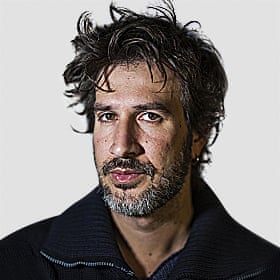
Lorenzo Tondo
in Rome
Russian foreign ministry spokesperson Maria Zakharova has said on Monday that Italian president Sergio Mattarella’s comments at the University of Marseilles earlier this month (Europe Live on 6 Feb) comparing Moscow to Nazi Germany over its invasion of Ukraine will not go “without consequences”.
“During a lecture at an educational institution, he said he believed that Russia could be equated with the Third Reich,” Russian news agency Ria Novosti quoted Zakharova as saying on Russian state TV.
“This cannot, and will never, be left without consequences”, she added.
Shortly after Zakharova’s comments, the pro-Russian hacker group “NoName57” attacked the telematic system of transportation and several Italian banks, citing how Mattarella is “Anti-Russian.”
Zakharova described Mattarella’s speech as “blasphemous inventions”.
Premier Giorgia Meloni said the attacks against Mattarella “offend the whole nation, which the head of state represents.
“I express my full solidarity, as well as that of the entire Government, to President Mattarella, who has always firmly supported the condemnation of the aggression perpetrated against Ukraine”, the prime minister said in a statement.
Ukrainian president Zelenskyy to visit Saudi Arabia on Wednesday
We are just getting a line from the Agence Frence-Presse that Ukrainian president Volodymyr Zelenskyy will visit Saudi Arabia on Wednesday, just a day after US-Russia talks are due to start there…
Zelenskyy spoke briefly about the trip last week, even if without giving dates, and insisted that he had no plans to meet Russian or US officials there.
One to watch.
Confirmation of US-Russia talks on Tuesday
US secretary of state Marco Rubio, National Security Adviser Mike Waltz, and special envoy Steve Witkoff will meet with Russian delegation in Riyadh, Saudi Arabia, on Tuesday, the US state department spokesperson Tammy Bruce confirmed.
Poland’s Sikorski floats idea of Nobel peace prize for Trump for fair peace deal in Ukraine
Polish foreign minister Radosław Sikorski put forward one of the most creative proposals on how to get to US president Donald Trump, influence his position on peace talks with Russia and make him side with European allies on the need of a just and lasting peace with appropriate security guarantees for Ukraine.
Playing off Trump’s well-known desire to get praise and public recognition, he suggested that Europeans could use the promise of a Nobel peace prize to get him on side.
“I would tell him that we, Europeans, control the Nobel peace prize. If you want to earn it, the peace has to be fair,” he told the Munich Security Conference over the weekend.
Here’s the clip.
Europe needs to show unity, come up with plans on security guarantees, Spanish foreign minister says
Sam Jones
in Madrid
Spain’s foreign minister, José Manuel Albares, says today’s meeting of European leaders in Paris has three main objectives.
In an interview this morning with the Onda Cero radio station, Albares said:
“It’s about showing European unity at such a crucial moment for European security.
Second, it’s about what we Europeans should do going forward to guarantee that there’s a just and lasting peace in Ukraine as soon as possible.
Third, it’s about analysing and deciding what we Europeans need in order to be able to achieve that just peace and to keep helping Ukraine win peace; it’s also about European security and the protection of our citizens.”
Albares said he didn’t think anyone would be talking about sending troops to Ukraine as “peace is still very far away”.
He also rejected suggestions that the meeting was a direct response to what had been said in Munich last week, saying:
There’s a new [US] administration that’s putting forward new ideas on Ukraine and, at the same time, we’re about to enter the fourth year of war and unjustified aggression. It’s very legitimate that, faced with this new panorama, Europeans should be meeting and reflecting on taking a series of decisions because all this affects our security and our European values.




